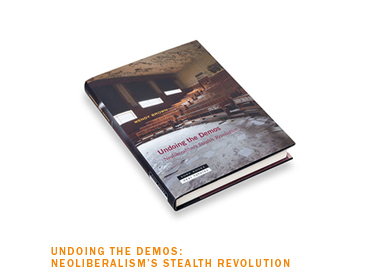 |
 
|
 |
 |
 |
|||||||||||||||
 |

|
||||||||||||||||||
| |
FORTHCOMING IN PAPERBACK
Neoliberal rationality — ubiquitous today in statecraft and the workplace, in jurisprudence, education, and culture — remakes everything and everyone in the image of homo oeconomicus. What happens when this rationality transposes the constituent elements of democracy into an economic register? In vivid detail, Wendy Brown explains how democracy itself is imperiled. The demos disintegrates into bits of human capital; concerns with justice cede to the mandates of growth rates, credit ratings, and investment climates; liberty submits to the imperative of human capital appreciation; equality dissolves into market competition; and popular sovereignty grows incoherent. Liberal democratic practices may not survive these transformations. Radical democratic dreams may not either. In an original and compelling theoretical argument, Brown explains how and why neoliberal reason undoes the political form and political imaginary it falsely promises to secure and reinvigorate. Through meticulous analyses of neoliberalized law, political practices, governance, and education, she charts the new common sense. Undoing the Demos makes clear that, far from being the lodestar of the twenty-first century, a future for democracy depends upon it becoming an object of struggle and rethinking. “Wendy Brown’s new book, Undoing the Demos, is a clarion call to democratic action. In close conversation with Michel Foucault’s 1979 lectures on The Birth of Biopolitics, Brown brilliantly explores how the rationality of neoliberalism is hollowing out the modern subject and, with it, our contemporary liberal democracies. Delving deep into the logic of neoliberalism and widely across the spectrum of neoliberal practices, from benchmarking to higher education policy, Brown offers a compelling new dimension to the critical work on neoliberalism. It is necessary reading today — powerful and haunting.” — Bernard E. Harcourt, Isidor and Seville Sulzbacher Professor of Law, Columbia University and Directeur d’études, École des hautes études en sciences sociales “With this passionately incisive critique of neoliberal (ir)rationality, Wendy Brown delineates the political stakes of the present. Tracing its antipolitical and antidemocratic impulses, she challenges us to defend and extend the possibilities of a popular politics that makes the promises of democracy come true.” — John Clarke, Professor Emeritus of Social Policy, The Open University “This is a book for the age of resistance, for the occupiers of the squares, for the generation of Occupy Wall Street. The premier radical political philosopher of our time offers a devastating critique of the way neoliberalism has hollowed out democracy. But the victory of homo oeconomicus over homo politicus is not irreversible. Wendy Brown has little time for ‘left melancholy.’ Hers is a call to arms for the defense of the enlightenment principles of freedom, equality, and solidarity and for reimagining and deepening democracy. After reading Brown, only bad faith can justify the toleration of neoliberalism.” — Costas Douzinas, Director of the Birkbeck institute for the Humanities and author of Philosophy and Resistance in the Crisis “Wendy Brown vividly lays bare neoliberalism’s perverse rationality, the ‘economization of everything,’ documenting its corrosive consequences for public institutions, for solidaristic values, and for democracy itself. Essential but unsettling reading, Undoing the Demos is analytically acute and deeply disturbing.” — Jamie Peck, author of Constructions of Neoliberal Reason “Brown deepens the conceptual analysis and criticism of neoliberal ideology, now on the point of becoming the dominant way people think about themselves, their lives and their social world. In illuminating detail, she also discusses the real and horrifying social changes taking place partly as a result of the way in which this ideology is being implemented. A major contribution, presenting its arguments with power and clarity, this book helps us understand the world we have increasingly been forced to live in, and to begin the process of thinking about what might be done to revitalize our political imagination and practices.” — Raymond Geuss, Professor Emeritus of Philosophy, University of Cambridge
Also by this author: See also:
|
||||||||||||||||||
| |
|||||||||||||||||||
| |
|
|
|
|
|
|
|
||||||||||||